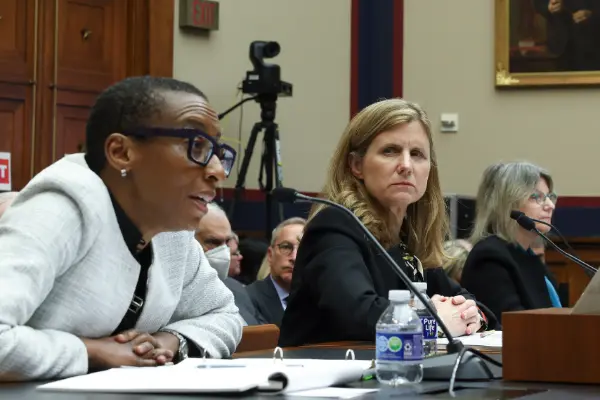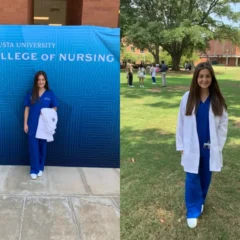Liz Magill husband is Leon Szeptycki – who is the man behind the recently resigned University of Pennsylvania President?
According to legend, behind every successful man, there is a woman.
Hence, it must follow that behind every successful woman, there is man.
For recently ousted University of Pennsylvania President Liz Magill, that man is her husband, Leon Szeptycki.
In this article, we present the story behind the union of Elizabeth Magill and her husband.
Who is Liz Magill husband?

Liz Magill husband is Leon Francis Szeptycki, an American lawyer and expert in natural resources law and policy.
He is a Yale-educated lawyer who met future University of Pennsylvania President Liz Magill during their time at the University.
Liz Magill and husband got married in 1990 and have been together since.
The couple have two children – son Alex, who is 25, and a daughter, Claire, who is 22.
According to Liz Magill, her husband fetches her a cup of coffee every morning before she gets out of bed.
Elizabeth Magill has been in the news for all the wrong reasons recently after being ousted from her position as President of the Unviversity of Pennsylvania.
Magill announced her resignation on December 9, 2023 following criticism from university donors, alumni, and others for her handling of anti-Semitism on campus in the wake of the 2023 Hamas-led attack on Israel.
A little more than a year into her presidency, Magill came into the spotlight in the fall of 2023 as criticism of the University of Pennsylvania’s response to alleged anti-semitism mounted.
In the wake of the October 7 Hamas-led attack on Israel and the ensuing conflict, major donors began to publicly withdraw their support for the university and made calls for Magill to resign.
READ ALSO: Who is Ian Cramer? – All About Senator Cramer’s Son
In response Magill announced a plan in November 2023 to combat antisemitism with a task force and a student advisory group.
On December 5, 2023, Magill testified in front of the House of Representatives Committee on Education and the Workforce, along with the presidents of MIT and Harvard, about anti-semitism on university campuses.
Exchanges the three university presidents had with Republican Congresswoman Elise Stefanik about whether calls for Jewish genocide would be considered bullying and harassment under campus policies went viral, drawing tens of millions of views on social media.

Magill responded that it would be “context-dependent” whether calling for genocide would violate the university’s policy.
This drew condemnation, including from Pennsylvania Governor Josh Shapiro.
Donor Ross Stevens threatened to withdraw a $100 million donation, and the board of trustees held an emergency meeting on December 7, with Magill retaining her position. The Wharton Board of Advisors, which oversees the Wharton School, called for a change in leadership. A coalition of donors, politicians, and business leaders also denounced her testimony.
Over 11,000 people signed a petition calling for her resignation.
On December 9, 2023, Magill announced her resignation as president.
She will continue to serve as the leader of the university until a replacement is found.
No word on what Liz Magill husband, Leon Szeptycki thinks of this brouhaha.
Liz Magill biography

Below is a biography of Liz Magill provided by the University of Pennsylvania.
On July 1, 2022, M. Elizabeth “Liz” Magill became the University of Pennsylvania’s ninth President. A legal scholar and inspiring leader, Magill joined Penn after serving as Executive Vice President and Provost at the University of Virginia and, prior to that, as the Richard E. Lang Professor and Dean of the Stanford Law School.
Magill’s leadership at UVA and Stanford brought transformative changes to both institutions.
During her successful tenure as Provost at the University of Virginia, Magill oversaw the university’s teaching and research activities, directing the academic administration of its 12 schools as well as the university’s library, art museums, public service activities, institutes and centers, and foreign study programs.
A highly skilled recruiter, at UVA Magill led the searches and recruited more than half of the school deans, helping establish the most diverse group of school deans in the university’s history.
Among her other notable achievements, she led UVA’s revision of its internal budget system and, as part of President Jim Ryan’s 2030 plan, she helped launch an historic grand challenges program to transform the depth and impact of the university’s research, and led the effort to enhance the university’s undergraduate advising for its more than 17,000 undergraduate students.
Working closely with President Ryan and his leadership team, Magill was pivotal in leading UVA’s response to the COVID-19 pandemic, working not only for the safety of those at the university, but also for the safety of the broader Charlottesville community, and ensuring transparency through regular communications with UVA students, faculty, staff, parents, alumni, and community members.
Prior to becoming provost at UVA, Magill served seven years as dean of Stanford Law School. There, she helped establish an innovative Law and Policy Lab, and also launched the school’s Global Initiative, which was funded by Stanford Law School’s largest alumni gift ever.
She expanded and redesigned student life initiatives, with a strong emphasis on diversity and inclusion, and oversaw the expansion of Stanford Law’s public service commitments. At Stanford, Magill also presided over a transformative faculty revitalization, hiring nearly 30 percent of the law faculty.
Before joining Stanford, Magill served as a professor and leader at UVA’s School of Law for 15 years. When she left for Stanford in 2012, she was the Joseph Weintraub–Bank of America Distinguished Professor of Law, the Elizabeth D. and Richard A. Merrill Professor, and she had served as the school’s vice dean from 2009 to 2012.
A scholar of administrative and constitutional law, Magill serves at Penn as Trustees University Professor and Professor of Law at Penn Carey Law and is a fellow of the American Academy of Arts and Sciences and a member of the American Law Institute. She has been a visiting professor at Harvard Law School, held a fellowship in the Law and Public Affairs Program at Princeton University, and was the Thomas Jefferson visiting professor at Downing College, Cambridge University.
Her articles have been published in leading law reviews, and she has won several awards for her scholarly contributions.
Prior to her career in higher education, Magill acquired experience working in politics and at the U.S. Supreme Court. After completing her bachelor’s degree in history at Yale University in 1988, Magill served as a senior legislative assistant for energy and natural resources for U.S. Senator Kent Conrad, a position she held for four years. She left Capitol Hill to attend UVA’s School of Law, where she was articles development editor of the Virginia Law Review.
After graduating in 1995, Magill clerked for Judge J. Harvie Wilkinson III of the U.S. Court of Appeals for the Fourth Circuit and then for U.S. Supreme Court Justice Ruth Bader Ginsburg.
In Philadelphia, where Penn is the largest private employer, Magill serves on the Executive Committee of the Board of Directors of the Chamber of Commerce for Greater Philadelphia and on the Board of Directors for the Schuylkill River Development Corporation.
Liz Magill grew up in Fargo, North Dakota, and is married to her husband Leon Francis Szeptycki, a lawyer and expert in natural resources law and policy. They have two children.
UPenn
The University of Pennsylvania (often abbreviated simply as Penn or UPenn is a private Ivy League research university in Philadelphia, Pennsylvania.
It is one of nine colonial colleges and was chartered prior to the U.S. Declaration of Independence when Benjamin Franklin, the university’s founder and first president, advocated for an educational institution that trained leaders in academia, commerce, and public service.
Penn identifies as the fourth oldest institution of higher education in the United States, though this representation is challenged by other universities, as Franklin first convened the Board of Trustees in 1749, arguably making it the fifth oldest institution of higher education in the U.S.
The university has four undergraduate schools and 12 graduate and professional schools.
Schools enrolling undergraduates include the College of Arts and Sciences, the School of Engineering and Applied Science, the Wharton School, and the School of Nursing.
Among its highly ranked graduate schools are its law school, whose first professor James Wilson participated in writing the first draft of the U.S. Constitution, its medical school, which was the first medical school established in North America, and Wharton, the nation’s first collegiate business school.
Penn’s endowment is US$20.7 billion, making it the sixth-wealthiest private academic institution in the nation as of 2022.
In 2020, the university was awarded $1.5 billion in research grants, the fourth-largest of any U.S. university.
The University of Pennsylvania’s main campus is located in the University City neighborhood of West Philadelphia, and is centered around College Hall.
Notable campus landmarks include Houston Hall, the first modern student union, and Franklin Field, the nation’s first dual-level college football stadium and the nation’s longest-standing NCAA Division I college football stadium in continuous operation.
Thank you for reading Liz Magill Husband- Who is Leon Szeptycki?
No related posts found...
Popular Posts
Emdee Tiamiyu Arrested – All About Nigerian Youtuber Who Granted BBC Interview
Cause of Death of Jaclyn Jose, Bio, Daughter, Husband
Marie Wiseborn Wikipedia, Biography – Who is Moses Bliss Wife?
Laken Riley Athens – Authorities Provide More Details About Woman Found Dead at UGA
Amaechi Muonagor Biography, Wife, Net Worth
Godwin Okine is a journalism major with 10 years of experience in blogging, content creation, SEO etc.
Godwin loves reading and researching and puts those skills to use as the Founding Editor of Nigeriabombshell.com
Contact [email protected]







